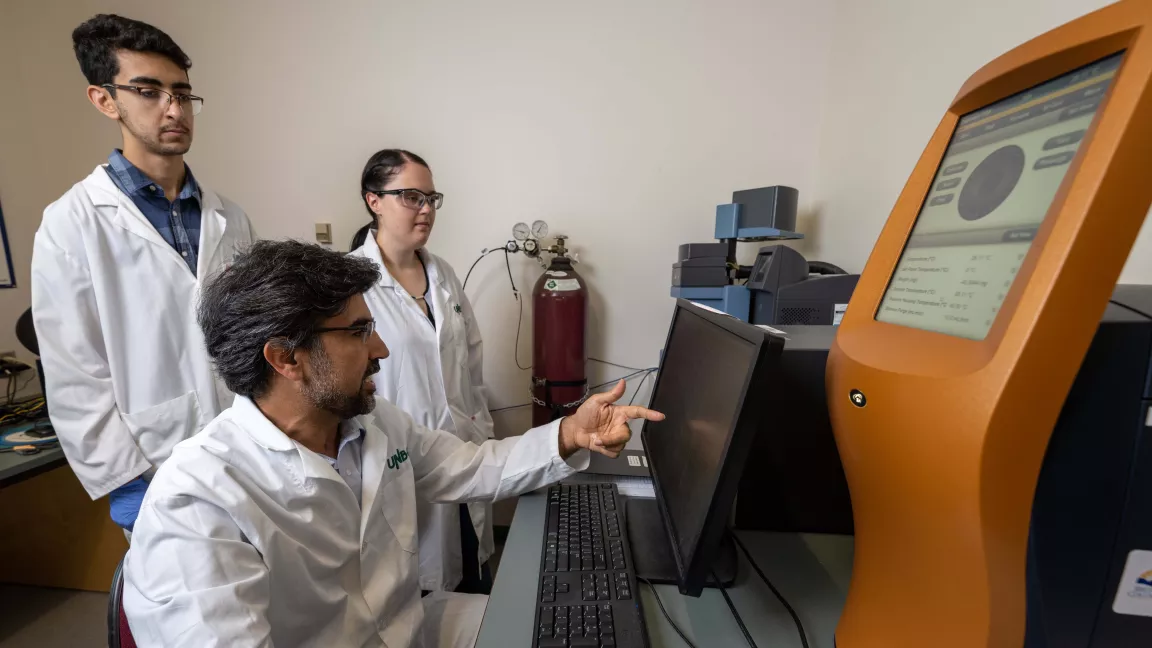NALS receives Standards Council of Canada accreditation
Northern Analytical Lab Services achieved the ISO/IEC 17025 International standard for testing and calibration laboratories, meaning it can produce and provide reliable water, soil and air test results for both UNBC researchers and external stakeholders.

The Northern Analytical Lab Services (NALS) at the University of Northern British Columbia has achieved a major milestone.
It has received accreditation from the Standards Council of Canada to the ISO/IEC 17025 International standard for testing and calibration laboratories. The accreditation signifies it can produce and provide reliable water, soil and air test results for both UNBC researchers and external stakeholders. It means they meet the international standards for testing labs.
“This accreditation will open up a lot of doors for us for research partnerships and industry who need those types of services,” explains Dr. Hossein Kazemian, the head of NALS. “Many of our research partners want to have research and tests done at an accredited lab and we can now serve our local communities with their testing needs, as part of our mandate as a community service provider in northern B.C.”
Ann Duong, NALS Quality Assurance Officer, launched the accreditation process in November 2019 which usually takes about a year but because of the COVID pandemic and shutdowns across Canada and the United States, this process was significantly delayed.
In August 2020, Duong submitted the documentation required, including lab processes for testing, methods, equipment, finances, and sample tests to ensure they conformed to the usual standards. Due to the coronavirus pandemic, the assessor from the Standards Council Canada completed the initial review remotely over the course of three days in late April 2021.
“They completed a management review, and a technical assessment related to our analytical lab testing and it was all done remotely,” Duong explained. “They made some recommendations where we could improve as no lab ever gets a perfect score. We had 20 non-conformances (out of more than 200 items) that were very minor things and had 30 days to address them and how we would correct them which we did with aplomb.”
They received word in late July that they were approved. There are some additional formalities that need to be completed before the NALS receives the official certificate.
Since NALS is an important community service, the Northern Development Initiative Trust gave the lab $30,000 to launch the accreditation process. Because of the research around workplace air quality that NALS research team is conducting in partnership with WorkSafeBC, their contribution toward this accreditation project was significant. Thanks to the WorkSafeBC support, the NALS has established the only research and development facility that has an industrial hygiene program in the region.
NALS also applied to WorkSafeBC’s research fund and received $144,123.36 to work on a chromium speciation project together with world-famous industrial hygienists Dr. Martin Harper from Zefon Inc. (USA) and Steven Verpaele from the Nickel Institute (Belgium). The NALS is the only lab in Canada that is partnering with WorkSafeBC at that level.
Prior to NALS accreditation approval from Standards Council Canada, Kazemian says some clients had to go outside of Canada for particulate testing. Now, NALS is certified to do it.
“Our aim is not to compete with any commercial lab,” Kazemian says. “But as a full-service equipment lab we are trying to help provide services that are not accessible to communities in the northern B.C. region.”
Among them is certification in industrial hygiene where NALS scientists can evaluate a workplace for environmental hazards to ensure employees are not working in a dangerous environment.
For the last five years, NALS has slowly built up highly qualified personnel of current and former students who work in the lab. Duong is among them who is doing her master’s research in the lab.
“It’s important for education at UNBC since there are NALS courses students take and they want to know that the research they’re doing is being done in an accredited lab,” Duong says. “Hopefully, some of them will decide to stay in the North to serve our communities as scientists and researchers, just like I did.”
“The research partnership with WorkSafeBC has connected NALS to world-renowned experts and created huge opportunities for us to learn from the best,” says Kazemian. “And with the NALS accreditation, we’re excited to participate in more collaborative research projects and to grow the intellectual capital in northern B.C."